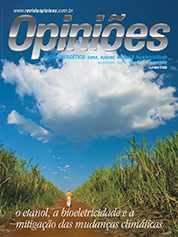Carlo Filippo Massimiliano Lovatelli
President of Abag - Brazilian Agribusiness Association
Op-AA-22
The Role of Ethanol and Bioelectricity in the Policy on Climate
The sugar-based energy chain is a case for study in the consolidation of technology and management in Brazilian agribusiness. It adds up to 40 years of experience since the implementation of the “Proálcool” program. In recent decades, the increase in productivity in sugarcane plantations and mills, the result of significant technological innovation, was the major factor that brought about the competitiveness of ethanol.
From the 70’s to the current decade, the average productivity in converting sugarcane to ethanol, in tons per liter, went up from a level 60 to a level 90 - a significant increase, in the magnitude of 50%. This improvement was made possible by increased extraction, processing and fermentation of sugarcane juice, as well as in distillation and in the field of energy.
Recently, an important mark in this ethanol usage evolutionary process was the launching, in March of 2003, of "flex fuel" car models. Since that year and until now, more than 8 million “flex” cars were sold. Expectations are that these models will total 75% of the fleet in 2020. Given that ethanol is being tested as fuel in buses, motorcycles, airplanes and even thermoelectric plants, the market for this fuel will grow even more.
The production of energy from biomass, called bioelectricity, grew with the power shortage that occurred in 2001. Bioelectricity is viewed as a clean and safe complementary alternative in the national energy matrix. Sugar and alcohol mills were competent to introduce bioelectricity in the energy scenario, so once the policy for this industry is defined in the near future, this energy potential will have been fully incorporated into the electric power sector.
Ethanol’s positive impact on the climate is quite considerable, as has been proven in research in the Advanced Studies Institute of the University of São Paulo (USP) and in the Energy Planning Interdisciplinary Nucleus of the University of Campinas (Unicamp). Between 1990 and 2006, the use of alcohol fuel allowed Brazil to reduce greenhouse gas emissions by 10% (excluding the volume resulting from deforestation).
In transportation and electric power generation, the contribution of alcohol is even more significant. In 2006, the use of ethanol fuel resulted in a 22% reduction in final emissions in those two sectors, and may reach 43% in 2020. The energy balance is also positive, whether compared to corn or gasoline. The Kyoto Protocol sets limits for CO2 emissions for all countries and market mechanisms for carbon credits to minimize the cost of the emissions that cause the greenhouse effect.
The initial compliance monitoring period of Kyoto targets will end in 2012. Currently, the debate focuses on the limits for the second period. Nobody knows for sure what those limits will be, but there has been recent consensus that the increase in temperature cannot be allowed to reach 2 ºC by the end of the century.
COP 15 – the 15th Conference of the Parties of the United Nations Framework Convention on Climate Change, which will take place in December, in Copenhagen, will have the mission of defining these targets for greenhouse gas emissions and reviewing the Kyoto Protocol. Irrespective of the positive or negative outcome of the negotiations, this will be an excellent opportunity for Brazil to take up a strong active position on climate change, taking a leading stance in the world on the use of clean energy and as related to biofuel.
Bearing in mind the main objective of calling the attention of the government and enhancing the global negotiations agenda at COP 15, ABAG and 13 other important Brazilian agribusiness, planted forests and bioenergy entities led the way by creating the Brazilian Alliance for the Climate, in the past month of September. In a paper delivered to Amb. Luiz Alberto Figueiredo, the Alliance points out the need for coordinated and urgent actions to prioritize available mitigation technologies that are economically feasible and have a short-term impact.
In the eyes of the Alliance, Brazil must create forms to measure, check and inform about progress in its deforestation reduction process. To that end, it must demand compensation for environmental services, in such a way that funds are channeled directly to agricultural producers. Brazilian agribusiness is prepared for the challenges of sustainability. We have a positive track record, the potential and the competence for that.




